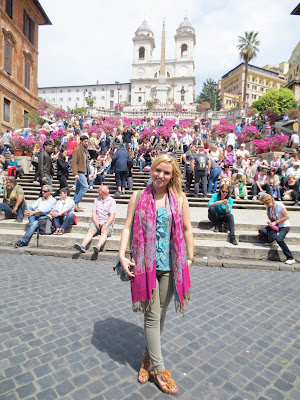The final
blog! I can feel the tears welling up in my eyes as I write this blog however, “Everything has to come to an end, sometime” (Baum, 1985).
This week I had to say goodbye to my class in ISOP. I had just begun to feel really settled in the school and I've made friends with many of the staff at the school. I will really miss the staff, who have been so friendly and welcoming to me and have helped me to gain so much more knowledge about multiculturalism in education. Due to my good relationship with the teachers, I hope to keep in contact with the school so I can conduct some research about multicultural teaching for my dissertation. I will also keep my ears open about any teaching positions which might open up in a couple of years time.
This week I had to say goodbye to my class in ISOP. I had just begun to feel really settled in the school and I've made friends with many of the staff at the school. I will really miss the staff, who have been so friendly and welcoming to me and have helped me to gain so much more knowledge about multiculturalism in education. Due to my good relationship with the teachers, I hope to keep in contact with the school so I can conduct some research about multicultural teaching for my dissertation. I will also keep my ears open about any teaching positions which might open up in a couple of years time.
This week, Stary Renek was alive with music and market stalls, due to the annual summer festival. The annual festival lasts two weeks at the end of June and includes many concerts and events and it has created a brilliant atmosphere in Poznan’s town centre.
As part of the festival, on Friday thousands of people attended Noc Kupały, an event which was set to attempt to break the Guinness world record for releasing lanterns into the sky. I later found out that this lantern festival was not without its controversy, as last year a lantern had fallen and damaged a tram. Not to mention the fact that people, despite many attempts, could not successfully release the lanterns! However, we enjoyed watching them try!

Noc Kupały

Noc Kupały
I have thoroughly
enjoyed my time in Poznan and have met so many fantastic people. I have already
spoken to some of my friends about travelling together over the summer or next
year. Regardless of this, it is still very difficult to say goodbye. On the
one hand I am eager to get home. However on the other, I know when I get home I
will want to be back. Thankfully I have already made plans to meet a group of
Erasmus students this summer for a reunion party in August!
 |
| Enjoying |
I have
learnt so much from my time in Poznan, about teaching, culture, language and
myself. I will never forget how wonderful Poznan is and I am sure I will be
back! Thank you ESN, to everyone I have met here, to everyone at home who encouraged me to do this, and last but not least, thank
you Poznan.
“There’s a trick to the 'graceful exit.' It begins with the vision to recognize when a job, a life stage, or a relationship is over — and let it go. It means leaving what’s over without denying its validity or its past importance to our lives. It involves a sense of future, a belief that every exit line is an entry, that we are moving up, rather than out.” (Goodman, 2013)
With that all said, I hope that the end of Erasmus will be the beginning of a happy new chapter in my life.
References:
Baum, L,F. (1985) 'The Marvelous Land of Oz' Puffin Classics.
Goodman, E. (2013) available at: http://www.goodreads.com/quotes/tag/endings accessed on 22.06.13
“There’s a trick to the 'graceful exit.' It begins with the vision to recognize when a job, a life stage, or a relationship is over — and let it go. It means leaving what’s over without denying its validity or its past importance to our lives. It involves a sense of future, a belief that every exit line is an entry, that we are moving up, rather than out.” (Goodman, 2013)
With that all said, I hope that the end of Erasmus will be the beginning of a happy new chapter in my life.
References:
Baum, L,F. (1985) 'The Marvelous Land of Oz' Puffin Classics.
Goodman, E. (2013) available at: http://www.goodreads.com/quotes/tag/endings accessed on 22.06.13





































